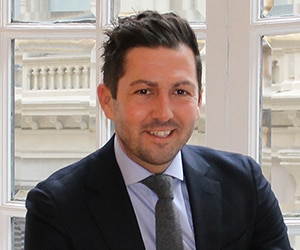James Stickland is CEO of Veridium, a company focused on an authentication platform that uses biometrics. He speaks with Global Finance about fintech, cybersecurity and the wisdom of border walls.

Global Finance: What is the central challenge for multinationals, especially banks, when it comes to cybersecurity?
James Stickland: I was involved in technology and its impact on banking at J.P. Morgan and HSBC, both of which have advanced security strategies. Generally speaking, banks have massive walls around data and assets that insulate them from external threats. But then they leave a key under the mat, so the systems are vulnerable.
The personal computer has made systems more complex. We refresh passwords frequently and make them more complex, but the human mind and memory are not smarter. It can cost a company roughly $200 per user, per year, to manage passwords, and that can be an eight-digit cost for some institutions. Even CSOs [chief security officers] write down passwords and stick them on their laptops. If a fingerprint, face recognition or other biometric is used, I don’t need to remember my password. Also, with biometrics, insiders cannot deny their involvement in fraud, as happened in the LIBOR case. You want the system to work for employees, clients and contractors.
Biometrics are more secure than a token or password. Bad people can’t reset your face, your fingerprints or your iris. We have not seen a major biometric data breach yet.
GF: What are potential clients most interested in?
Stickland: People are very interested in know your customer (KYC) and anti-money laundering (AML) applications, and also cutting costs. A large bank might spend hundreds of millions of dollars to onboard clients, but that doesn’t differentiate it. With data and heuristics, you can build profiles to simplify processes that now require 50 pieces of paper. In capital markets, there is still a massive focus on regulatory fraud and risk. The insider threat is still a huge investment area for fintech; data can predict user activities and flag anomalies.
GF: What gives potential clients pause?
Stickland: Veridium offers a subscription model, and there is an element of distrust about the location of data. It’s critical to ask a lot of questions around data privacy and security. How are you storing my biometrics? Can the system be hacked? You have to trust the custodian of stored data, so some don’t want storage in the Cloud, some even want to view the server. Also, cost is still a big concern. But there can be over 75% savings in some biometric deployments.
GF: Where is biometric security taking hold?
Stickland: Emerging countries that don’t have legacy infrastructure or policy restrictions, including India, Chile, Brazil, Senegal and Nigeria. One of the slowest countries is the US, due to public concern and bank ubiquity, but we are working with the US government, immigration and special operations. China is advanced in biometrics, especially facial recognition, for payments authentication, and those companies are part of China’s e-commerce ecosystem.
GF: What do you think of US debate over the Mexico border wall?
Stickland: Speaking as a technologist, there is a better way to resolve border issues. Motion detection, for example. There should be pre-screening of travelers. If governments commit to acquiring and sharing traveler data, we can stop unlawful immigration, trafficking and other problems. Even drone technology is cheaper than a brick-and-mortar solution. Spend the rest on jobs.



